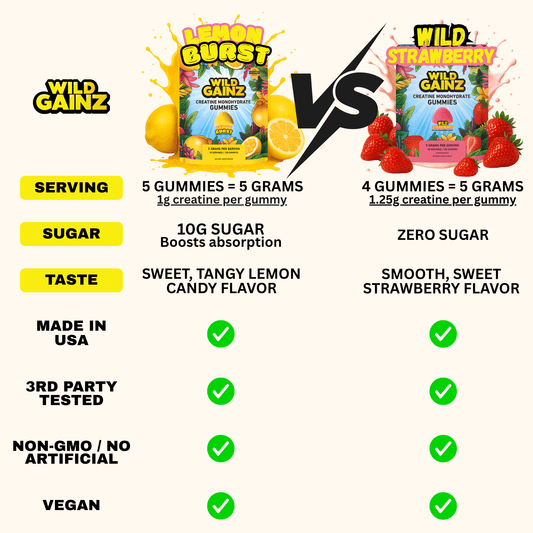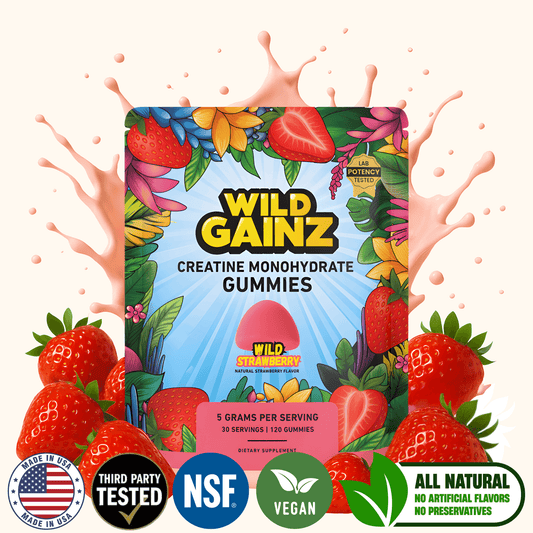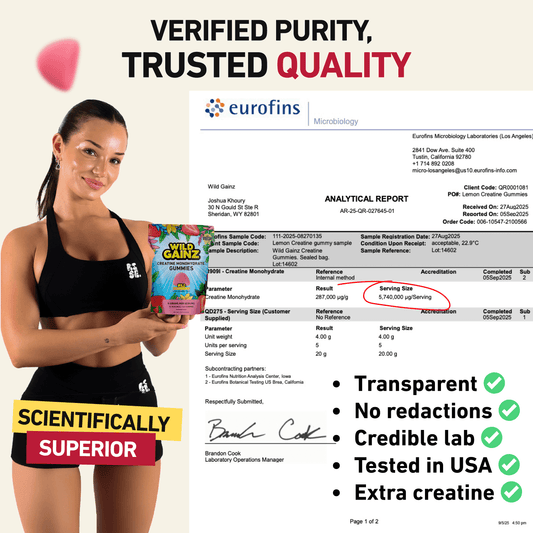Bloating and Creatine: Benefits, Myths & Best Practices
Creatine is one of the most researched and effective supplements for boosting strength, muscle growth, and athletic performance. However, there's a common belief that creatine causes bloating. Is this fact or fiction? In this guide, we’ll break down the truth about bloating and creatine, debunk common myths, and share the best practices for avoiding discomfort while maximizing the supplement’s benefits.
Table of Contents
- Does Creatine Cause Bloating?
- Why Do Some People Experience Bloating with Creatine?
- Common Myths About Creatine and Bloating
- How to Prevent Bloating from Creatine
- Best Form of Creatine to Avoid Bloating
- Final Thoughts
Does Creatine Cause Bloating?
The short answer: not always. The belief that creatine causes bloating primarily stems from the way creatine works. Creatine helps muscles retain water, which improves hydration and enhances muscle performance. However, this doesn’t automatically translate to bloating.
Bloating typically refers to fluid retention in the stomach, making you feel puffy or overly full. In contrast, creatine primarily draws water into muscle cells, which actually benefits muscle growth and recovery rather than causing discomfort.
Why Do Some People Experience Bloating with Creatine?
While creatine itself doesn’t necessarily cause bloating, some individuals might experience mild water retention. Here’s why:
1. Creatine Loading Phase
Many people start with a loading phase, which involves taking 20g of creatine per day (divided into 4 servings) for about five days. Since this is a high dose, it can lead to temporary water retention, making some people feel bloated. However, this effect typically subsides once a lower daily maintenance dose (3-5g) is adopted.
2. Poor Hydration
Creatine pulls water into muscles, meaning you’ll need to drink extra fluids to prevent dehydration. If your water intake is too low, your body may start retaining fluid elsewhere, leading to temporary bloating.
3. Poor-Quality Creatine
Some cheap creatine supplements contain additives, fillers, or impurities that might lead to digestive discomfort and bloating.
4. Individual Sensitivity
Each person's body reacts differently to supplements. Some individuals might be more prone to water retention or mild digestive discomfort when introducing creatine.
Common Myths About Creatine and Bloating
Myth #1: Creatine Makes You Look Fat
One of the biggest misconceptions is that creatine causes fat gain. The reality is that creatine holds water inside your muscles, improving fullness. It does not increase fat storage.
Myth #2: Only Water Weight is Gained
While creatine does increase muscle hydration initially, the real benefits come from improved performance, recovery, and muscle growth. Long-term use leads to increased muscle mass, not just water retention.
Myth #3: All Creatine Causes Bloating
Not all creatine supplements result in bloating. The risk can be minimized by choosing high-quality creatine, like Wild Gainz Creatine Gummies, which provide optimal dosages in a digestible format.
How to Prevent Bloating from Creatine
If you’ve experienced bloating with creatine or want to avoid any potential discomfort, follow these best practices:
1. Ditch the Loading Phase
Instead of taking large doses at the start, opt for a steady daily intake of 3-5g. This allows muscles to gradually saturate with creatine without excessive water retention.
2. Stay Hydrated
Drinking enough water is crucial when supplementing with creatine. Aim for at least 3-4 liters (around 100-130 oz) of water daily to ensure smooth digestion and proper hydration.
3. Choose a High-Quality Creatine Supplement
Many creatine powders come with additives that can contribute to bloating. Consider Wild Gainz Creatine Gummies, which provide a convenient, high-quality alternative that’s easy on digestion.
4. Take Creatine with Food
Some people experience mild stomach discomfort when taking creatine on an empty stomach. Try consuming it with a small meal or snack to improve digestion.
5. Avoid Sugary and Artificially Flavored Creatine
Some creatine supplements come loaded with artificial sweeteners or excess sugar, leading to potential bloating. Stick to high-quality, clean formulations to minimize digestive issues.
Best Form of Creatine to Avoid Bloating
Some forms of creatine are more likely to cause bloating than others. Here’s a breakdown:
1. Creatine Monohydrate (Best Overall)
Creatine monohydrate is the most researched and widely used form. When taken at moderate doses (3-5g per day), it has a low chance of causing bloating. Learn more about its well-documented benefits in this comprehensive review on creatine safety and efficacy.
2. Creatine Gummies (Highly Digestible Option)
Creatine gummies offer a more digestible alternative to powders, making them easier on the stomach. Wild Gainz Creatine Gummies provide a convenient and gut-friendly way to supplement without bloating concerns.
3. Micronized Creatine
Micronized creatine monohydrate has smaller particles for better absorption, reducing digestive issues.
4. Creatine Hydrochloride (HCl)
Some people find that creatine HCl is easier to digest than monohydrate, but it’s often more expensive and not as well-researched.
Final Thoughts
While bloating and creatine are often linked in fitness discussions, the reality is that creatine doesn’t directly cause bloating when used correctly. Most people experiencing bloating are either taking too much at once, not drinking enough water, or using low-quality supplements.
If you’re looking for a hassle-free creatine option that won’t leave you feeling bloated, try Wild Gainz Creatine Gummies. They provide all the muscle-boosting benefits of creatine in a convenient, easy-to-digest gummy format.
Have you experienced bloating with creatine before? Share your thoughts in the comments below!






